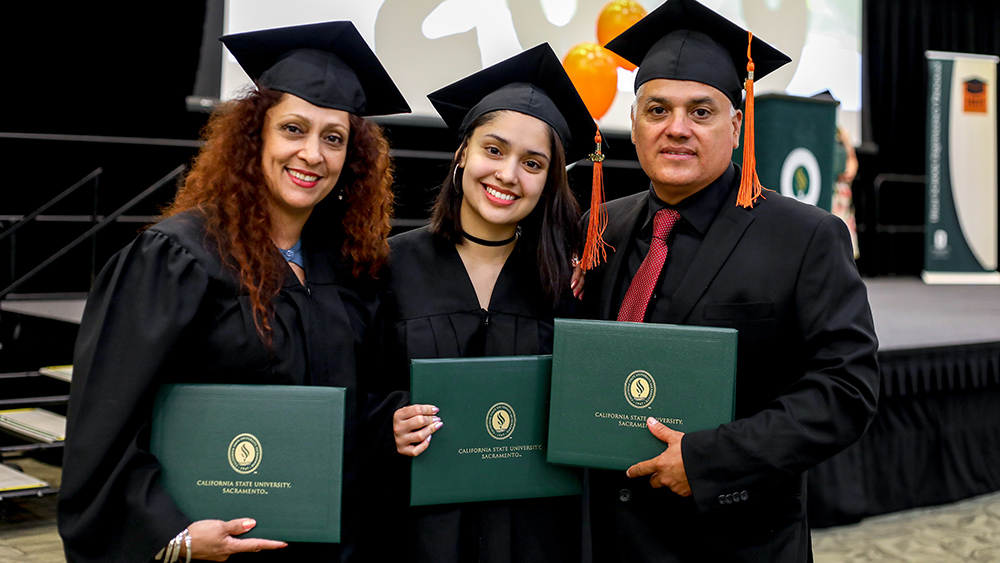By Cynthia Hubert
 New high school graduates: mom, Gloria Mejia Cardenas; daughter, Vivian Mejia Cardenas; dad, Armando Mejia Cardenas. (Sacramento State/Erica Perez)
New high school graduates: mom, Gloria Mejia Cardenas; daughter, Vivian Mejia Cardenas; dad, Armando Mejia Cardenas. (Sacramento State/Erica Perez)They toiled in agricultural fields from dawn until dusk, raced home to feed their children, then hit the books until late at night.
On Sunday at Sacramento State, they donned caps and gowns and celebrated.
Hundreds of friends and family members whooped, clapped and took photos in the University Union Ballroom as 74 men and women obtained their high school equivalency certificates.
“¡Sí se puede!” one graduate declared as he raised his certificate in the air. The phrase, a motto for the United Farmworkers of America, translates to “Yes, it can be done!” in English.
Sac State’s High School Equivalency Program (HEP) helps migrant and seasonal farmworkers obtain their certificates from the state of California, then get jobs in their chosen professions or enroll in college classes. The federally funded program is one of the most successful of its kind in the country, said Viridiana Diaz, Assistant Vice President of Strategic Diversity Initiatives at the University.
The Sac State program graduated 25 students in its first year in 2017, and 53 last year. “We’re funded to serve 70 students, so this year with 74 graduates we are performing at above 100 percent,” Diaz said. About 90 percent of Sac State’s HEP graduates attend college, enter job training programs, attain better employment or join the military, she said.
Such successes set the stage for graduates to build brighter futures for themselves and their families, said Diaz.
“These are parents who sometimes have two jobs, mostly in physical labor and agriculture,” Diaz said. “They work really, really hard, from 4 in the morning until 5 or 6 at night, and then come to the classroom. For them to be able to achieve this, pass tests in five different subjects, and graduate is a huge deal. It’s a major milestone.”
Sac State recruits its HEP students from churches, community groups and events throughout Northern California. They attend classes at California Human Development in Lodi, El Concilio in Stockton, Woodland Community College in Woodland, Fairsite Elementary School in Galt, Gray Avenue Middle School in Yuba City and Bates Elementary School in Courtland.
HEP is “the perfect example of our mission as an anchor university,” with Sac State partnering with other organizations to help strengthen the region, Diaz said.
The University provides instructors, tutors, study materials and testing fees for HEP students. Students have up to a year to complete classes and pass tests in English, math, science, social science, and reading and writing.
On Sunday, the 2019 graduates marched into the University Union wearing black caps and gowns with orange tassels to the tune of “Pomp and Circumstance.” Proud friends and relatives held flower bouquets, snapped pictures and shed happy tears.
Beneath a balloon canopy and a large screen flashing the word “¡Felicidades!” or “Congratulations!” students listened to remarks from Sac State President Robert S. Nelsen, among others.
“Today is a special day, a day that came after a lot of sacrifices and a lot of hard work,” Nelsen said. “It is your day.”
“We are in bad times,” the President said, mentioning troubles at the nation’s borders and shooting rampages that have shaken the country. “But I know that together, and with education, we can change this country and this world. I have faith in you.”
Maria Alejandra Estrada Pullido, a recent HEP graduate, also addressed the group.
“I was in the same shoes as you, working and with a short time to shower and eat before running to class” in Woodland, she said. She promised the graduates that the effort would pay off.
Pullido, who once picked grapes to earn a living, now works as a medical assistant and soon plans to study nursing at Sac State.
Xochitl Murguia, who received her certificate Sunday, did her HEP studies in Lodi.
“My motivation was for my boys,” said Murguia, who has four children. “As a single mom, I know that having a diploma will make it easier for me to get better job opportunities.” She plans to enroll in college and possibly become a social worker.
The HEP classes challenged her at times, she said, especially mathematics.
“I told my teacher, ‘I’m not going to pass it,’ ” she said. But she studied harder and watched YouTube videos that demonstrated how to solve various problems. She refused to give up.
“I didn’t think I could do it,” she said with a smile. “But here I am!”
